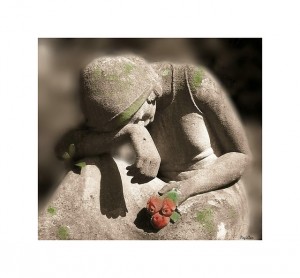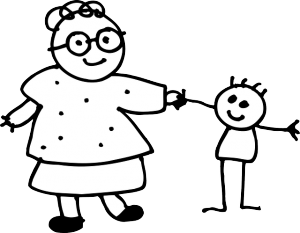While I had already planned and drafted another post for this week, that topic, which would have been important and interesting to me on any other day, suddenly seemed trivial. One of my family members is in critical condition and on life support. By the time this post goes live, he will have passed. In the spirit of Feminist Reflections and talking about everyday life, this week I talk about grief and death. During this emotional time for our family, I have attempted to write this post with clarity. But I have a lot on my mind. I write with a heavy heart as my family experiences grief, and I ponder the meaning of death.
How do we mourn and comfort others who are grieving? How do we grieve differently when people die at different ages, or unexpectedly? Can we believe in something that will help us through our grief? How are our spiritual beliefs connected to, or guided by, our scientific training?
Sociologists attempt to use our scientific tools to understand the world, to give meaning and order to things. But as much as we can understand death as a physiological or biological event, the emotional and spiritual experience of someone’s death is often hard to make sense of with social scientific theories (at least, in my opinion). Still, I believe, as do many others, that emotional and “rational” thinking helps to make sense of the death of a loved one.
Thinking Back
As an only child, both of my biological grandfathers died before I was born. My maternal grandmother died when I was five. My paternal grandmother remarried the year that my parents got married, and my “step-grandpa” (but in all honesty, my grandfather) died when I was in graduate school. My grandma lived on her own for a few years until her death.
Grandma died seven years ago on Memorial Day weekend. At the time, I was living about five hours from my hometown in Iowa. She had lived independently in her own house for a few years. When it became clear that she could not live on her own, my family decided to move her into an assisted living environment. She lived there only a short time before ending up in the hospital, for reasons I cannot remember, and then into hospice. Ironically, the hospice was located in the same nursing home where she lived before her death.
My grandma was in hospice for longer than the usual time. Dementia had taken over. She stopped eating. She muttered phrases. No one was clear of their meaning. My mom did not want me to see my grandma in this condition. But I was incredibly close to her. My friends loved her. As many of them said, “she had a lot of spunk.” When I moved away for college and graduate school, I called her weekly; that is, until she went to hospice and could no longer carry on a telephone conversation. Still, I needed closure. I needed to say goodbye.
My spouse, our daughter (age two at the time), and I went to visit my grandma that Memorial Day weekend. Grandma, who lay there in a fragile, non-coherent state, reached out and held my daughter’s — her great granddaughter’s — hand with a strong grip.  The next day, she finally said goodbye.
The next day, she finally said goodbye.
I can believe my grandma wanted to see her great granddaughter and me before she died. Is this what was going on? There is no empirical way to prove it. Yet science and spirituality guided me in this belief.
Grandma lived longer than usual in hospice. My family has many questions about why she would not ‘let go’. She would say in her non-lucid state she was sorry, and mutter other phrases too. Since she was a former Catholic, we thought she was sorry for leaving the church and had her last rites read. Beyond this, every family member and friend spoke to her on the phone before she died. But she did not let go until the day after we visited her, and she held my daughter’s hand.
I cannot know, really, if my grandma needed to see us before passing on. But I believe that she did. This is one way I have dealt with my grief.
Seven years later, we have lost others. As much as I miss my grandma, I can accept her death as normative. She was in her mid-eighties. But my father-in-law died from cancer when he was only sixty-three, and the time from diagnosis to death was a short four months (after predictions of a year). The third anniversary of his death just passed. Although I can see my father-in-law, with his positive attitude and shining smile standing from his place above and telling us to live life to the fullest, he left us too early. I can talk sociologically about the factors that might have influenced his health, which helps me understand his death at an younger age. But this does not make my grief easier. And now, another family member leaves us too early, and unexpectedly.
While death is part of life, we often imagine it will happen in old age, near the end of the life course for most people. When it does not, when it is unexpected, it is harder to understand and to know how to comfort others or ourselves. Saying it was someone’s ‘time’ seems callous and lacks empathy, especially when the person was not in pain, was young, or the death was unexpected. Friends and colleagues have lost children at younger ages, and I cannot imagine the pain or the grief they experienced.
I do not study aging, death, dying, or grief. But as a sociologist I want to make sense out of the social world. Death and mourning, especially when we do not expect it, are hard to make sense of. There is no correct thing to say to those in mourning. Grief strikes. We can support our loved ones and acknowledge that there are different ways of grieving. We deal with it in our own ways.
While your death was untimely and we will miss you, we will never forget the memories and your positive spirit. You had a huge impact on your family and this world that will not be forgotten. May you rest in peace.


Comments 1
Susan Smiyh — June 23, 2015
Well written, even through your grief.